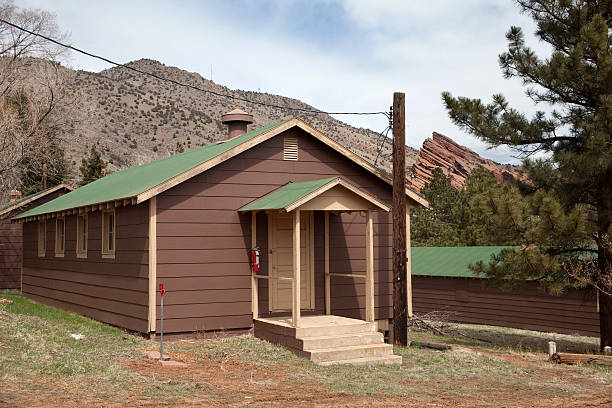
Foreclosure is a legal process where lenders reclaim properties from homeowners who default on their mortgage payments. Imagine facing foreclosure in Colorado, your dream home slipping away. The clock ticks, stress mounts, and options seem limited. Losing your home can be devastating. Is there a way out?
Selling a house in foreclosure might be possible, offering a glimmer of hope. This option could potentially save your credit score, avoid a deficiency judgment, and provide a fresh start. Understanding the process and legalities is important.
This blog post will delve into the process of selling a house in foreclosure in Colorado.
Foreclosure is the legal process by which a lender seizes a property due to missed mortgage payments. The process typically begins when a homeowner defaults on their loan for several months. Lenders then initiate legal proceedings to reclaim the property. Homeowners face foreclosure for various reasons, including job loss, medical emergencies, or financial mismanagement.

The foreclosure process involves several legal steps. These include formal notification, court hearings, and potential eviction. Homeowners have rights during this process, including the opportunity to catch up on payments.
In 2023, 0.26% of U.S. properties were in foreclosure. This statistic highlights the ongoing challenges faced by some homeowners. Foreclosure can have severe implications for credit scores and future borrowing abilities. Understanding the process and seeking professional advice is crucial for those at risk of foreclosure.
Foreclosure significantly impacts property values in various ways. Foreclosed homes typically sell for 10-28% less than non-foreclosed properties. This price reduction affects the overall market trends in the area.
During foreclosure periods, neighboring home values often decline due to the presence of distressed properties. A short sale occurs when a homeowner sells their property for less than the outstanding mortgage balance. Buyer perceptions of foreclosed homes can be mixed. Some view them as bargains, while others worry about potential hidden issues. The neighborhood plays a crucial role in determining property values during foreclosure. A high concentration of foreclosed homes in an area can lead to a ripple effect, dragging down surrounding property values. This impact can persist even after the foreclosure process is complete.
Real estate investors often seek out foreclosed properties as potential investment opportunities. However, the overall market analysis must consider the long-term effects on equity and appraisal values in the affected neighborhoods.
Yes, selling a foreclosed home in Colorado is possible. Foreclosed homes in Colorado are competitively priced. Homeowners facing foreclosure have options to cure defaults and halt the process. Legal disputes related to foreclosures may be addressed in Colorado Court.

The foreclosure timeline in Colorado varies depending on individual circumstances. Lenders typically initiate foreclosure proceedings after several missed mortgage payments. Homeowners can explore alternatives to avoid foreclosure, such as selling their property.
Selling a home before the foreclosure auction date can be beneficial. This approach allows homeowners to potentially recover some equity and avoid credit damage. Interested buyers should be aware of the legal requirements involved in purchasing foreclosed properties.
A deed in lieu of foreclosure is another option for homeowners unable to sell. This process involves voluntarily transferring property ownership to the lender. Homeowners dealing with foreclosure should consult legal professionals for guidance on their options.
Chris Curry buys foreclosed houses in Colorado. He operates in major areas of Colorado state. Selling a home before the foreclosure auction date can be beneficial. This approach allows homeowners to potentially recover some equity and avoid credit damage. Interested buyers should be aware of the legal requirements involved in purchasing foreclosed properties. Chris Curry’s “we buy houses” service is available in locations such as Arvada, Denver, Westminster, Northglenn, Wheat Ridge, and Lakewood.
A deed in lieu of foreclosure is another option for homeowners unable to sell. This process involves voluntarily transferring property ownership to the lender. Homeowners dealing with foreclosure should consult legal professionals for guidance on their options. Chris Curry’s foreclosure purchase services extend to these Colorado areas, offering solutions for homeowners facing difficult situations.
Selling a house in foreclosure involves several crucial steps. Understanding these steps can help homeowners navigate the process effectively.
Steps to Selling a House in Foreclosure:
Timing is critical when selling a house in foreclosure. Acting quickly can increase your chances of a successful sale and potentially stop the foreclosure process.
A short sale offers homeowners an alternative to foreclosure. This process involves selling the property for less than the outstanding mortgage balance. Lenders may approve short sales to avoid costly foreclosure proceedings.
Eligibility for a short sale typically requires financial hardship and inability to pay the mortgage. Homeowners must prove their financial situation to the lender. Market conditions also play a role in determining short sale viability.
The short sale process begins with lender approval. Next, the homeowner lists the property and finds a buyer. Negotiations between the seller, buyer, and lender follow. Once an agreement is reached, the sale can proceed.
Drawbacks of short sales include credit score damage and potential tax implications. The process can be lengthy and may not guarantee foreclosure prevention. Lenders may also pursue the remaining balance after the sale.
Tips for a successful short sale:
Short sales provide an option for homeowners facing foreclosure. Understanding the process and potential outcomes is crucial for those who want to sell their homes.
During foreclosure, the mortgage remains active but enters default status. Lenders initiate the foreclosure process when homeowners fail to make payments. Options for mortgage resolution include loan modification, repayment plans, or selling the property.
Lenders play a crucial role in the foreclosure process. They may work with homeowners to find alternatives to foreclosure. Loan modification is one potential solution, allowing borrowers to adjust their mortgage terms.
Unpaid mortgages have serious consequences. The foreclosure will negatively impact the homeowner’s credit score. This can make it difficult to obtain future loans or credit.
Homeowners facing foreclosure may consider selling their home. Selling the property can help stop the foreclosure process. It allows homeowners to pay off the mortgage and avoid further financial damage.
Those looking to sell must act quickly. Time is limited once foreclosure begins. Homeowners should explore all options to resolve their mortgage situation. Working with the lender or seeking professional advice can help navigate this challenging process.
Negotiating with lenders offers a potential lifeline for homeowners facing foreclosure. Lenders may consider alternative repayment plans or loan modifications. Effective communication is crucial when approaching your lender about financial hardship.
Preparation is key before initiating negotiations. Gather all relevant financial documents and research potential options. Be honest about your situation and express a willingness to find a mutually beneficial solution.
Successful negotiations can lead to various outcomes. These may include loan modifications, forbearance agreements, or even debt settlement. Some lenders might agree to lower interest rates or extend the loan term.
Mediation services can help facilitate discussions between homeowners and lenders. These neutral third parties can guide the negotiation process. Remember, lenders often prefer to avoid foreclosure due to associated costs.
Persistence and patience are essential during negotiations. Document all communications with your lender. Consider seeking advice from a housing counselor or financial advisor for additional support.
Selling a foreclosed home comes with several potential pitfalls. Legal implications can arise from disputes with previous owners or lienholders. Financial risks include reduced property value due to market conditions. Foreclosures negatively impact nearby home prices, with an average 1.1% drop.

Liability issues may surface if the property has undisclosed defects or damages. The foreclosure process can be complex, leading to unexpected delays or costs. Sellers might face challenges in recouping their investment or covering outstanding debts.
Credit scores often suffer during foreclosure, affecting future home buying opportunities. Buyer disputes are common, as foreclosed properties may have hidden issues. Market conditions can fluctuate, influencing the ability to sell quickly or at desired prices.
Common pitfalls include:
Foreclosed homes typically spend less time on the market, but this can lead to rushed decisions. Nearly 10% of mortgage holders fear foreclosure, impacting overall market perception.
Necessary Repairs and Improvements: Address visible issues like leaky faucets or peeling paint. Fix any structural problems to increase buyer confidence. Update outdated fixtures and appliances for a modern appeal.
Depersonalize spaces by removing family photos and personal items. Arrange furniture to highlight room functionality and flow. Add neutral decor elements to create a welcoming atmosphere.
First impressions matter. Maintain a well-manicured lawn and tidy landscaping. Paint the exterior if needed and ensure a clean, inviting entryway.
Deep clean every room, including carpets and windows. Remove excess furniture and organize closets to maximize space. Consider renting a storage unit for non-essential items.
Research comparable properties in your area. Consult with a real estate agent for accurate pricing. Set a competitive price to attract potential buyers quickly.
Selling a home in foreclosure involves several legal requirements and potential risks. Homeowners must comply with state-specific foreclosure laws and disclosure obligations. Failure to meet these requirements can result in serious liabilities for sellers.

Disclosure is crucial when selling a foreclosed property. Sellers must inform potential buyers about the foreclosure status and any known issues with the property. Honesty in disclosure protects sellers from future legal troubles and builds trust with buyers.
Real estate attorneys play a vital role in navigating the complexities of selling a foreclosed home. They can review contracts, ensure compliance with local laws, and protect sellers’ interests throughout the process.
Tips for handling legal issues:
By addressing legal considerations proactively, homeowners can minimize risks and increase their chances of successfully selling a house in foreclosure.
I understand the challenges of facing foreclosure. It’s a stressful situation that many homeowners dread. But there’s good news: you can still sell your house in foreclosure.
Cash home buyers offer a lifeline to those struggling with foreclosure. These investors provide a quick and hassle-free way to sell your home. You won’t have to worry about lengthy listing processes or uncertain buyers.
As a cash home buyer in Denver, I’ve helped numerous homeowners avoid foreclosure. We buy houses in Denver, and the neighborhood areas of Colorado, offering fair prices for properties in any condition. This means you can sell your house fast, even if you’ve received a foreclosure notice.
The process is simple. I assess your property and make a cash offer within days. This allows you to stop foreclosure proceedings and move on with your life. You’ll be able to sell your home without the stress associated with traditional selling methods.
Selling to a cash buyer eliminates many hurdles of a typical home sale. There’s no need for repairs, staging, or open houses. You can sell your house in foreclosure quickly and easily, freeing yourself from financial burden.
Remember, receiving a foreclosure notice doesn’t mean you can’t still sell. Act quickly, and you may be able to sell your home before it’s too late.
Selling a house in foreclosure is challenging but possible. Homeowners facing foreclosure have options to explore. These include loan modification, short sale, or selling the property outright. Each option has pros and cons that require careful consideration. Understanding the foreclosure process and legal implications is crucial.
Seeking professional advice from real estate agents and attorneys is highly recommended. They can provide guidance on navigating complex procedures and negotiations. Timing is critical when selling a house in foreclosure. Acting quickly increases the chances of a successful sale.
Homeowners should explore all available resources and assistance programs. Government initiatives and non-profit organizations offer support to struggling homeowners. Open communication with lenders is essential throughout the process. Transparency can lead to more favorable outcomes for all parties involved.
While selling a house in foreclosure is stressful, it can provide financial relief. It allows homeowners to avoid further damage to their credit and move forward. With proper planning and expert help, selling a house in foreclosure is achievable.
@ 2024 Chris Curry. All Right Reserved